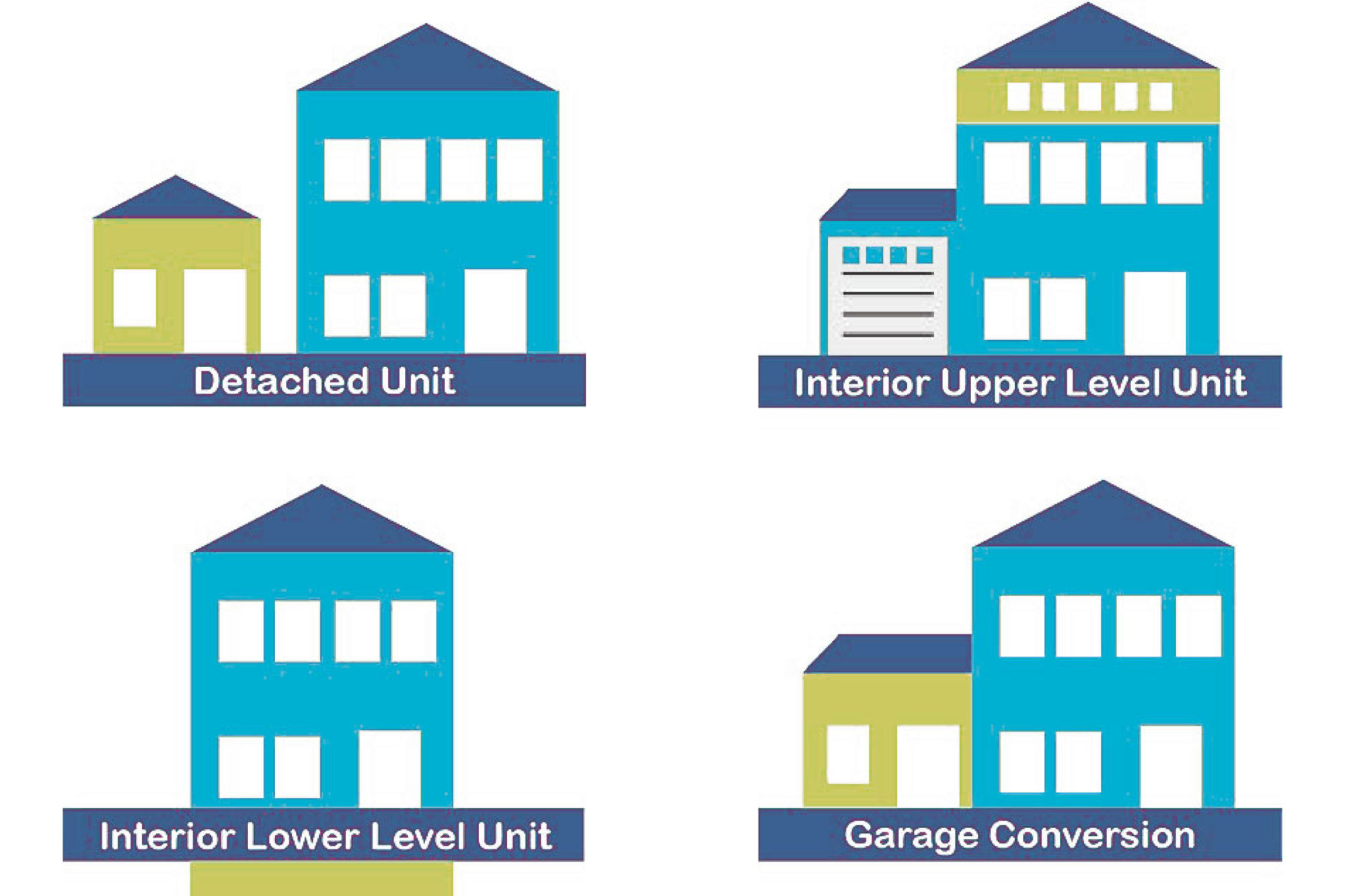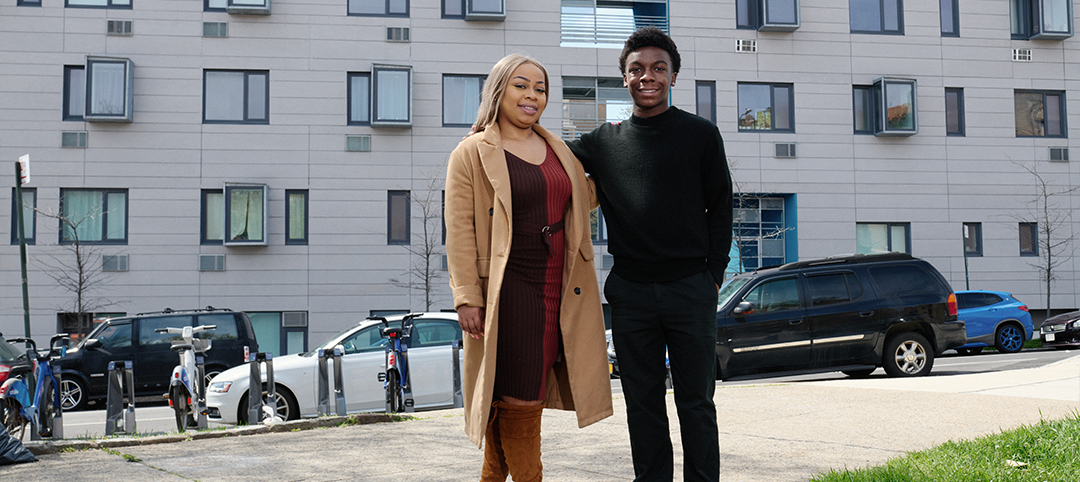
ADUs may be:
- Basement, attic, or other interior apartments
- Garage conversions
- Small stand-alone units on a single-family lot
- Any other permitted unit type
ADUs—also known as “casitas,” in-law suites, granny flats, and accessory apartments—generate rental income for homeowners, creating housing stability, and serve as a new source of affordable housing for teachers, students, first-responders, non-profit organization staff members and other workers priced out of rental markets. They are also a great way to provide affordable housing solutions for intergenerational families, including independent living for adult children or aging parents.
Source: New York State Homes and Community Renewal
Who qualifies:
- Homeowners with incomes at or below 100% of the area median income
- Owner-occupied single-family homes in communities zoned for ADUs by the Town of Bedford and the villages of Dobbs Ferry, Hastings-on-Hudson, and Irvington
- COMING SOON: Plus One ADU will be expanded to include Yorktown, Cortlandt, and Croton-on-Hudson
- Homeowners who need to legalize their existing ADU and/or bring it up to code
- Homeowners committed to renting to a long-term tenant, who may also be a family member, and will not use the accessory apartment as a short-term or vacation rental
Program features:
The NYS Plus One ADU program provides up to $125,000 in soft and hard costs per home to create or legalize accessory apartments in the specified service areas. Westchester Habitat in partnership with the Housing Action Council and partner municipalities will utilize this funding source to provide:
- ADU design and permitting
- Project budgeting
- Environmental site review
- Contractor selection & scoping
- Construction oversight
- Landlord training
- Post-construction monitoring
*Homeowners may be required to provide a minimum equity contribution in accordance with program guidelines. Westchester Habitat will provide options for this contribution.
Contact us.
For more information, contact us at adu@habitatnycwc.org.
In Partnership With
FAQ
Who is eligible to apply for this grant?
Homeowners whose primary residence and ADU are in an area permitted by the locality to have an ADU. Homeowners/applicants must live in one of four municipalities: Bedford, Dobbs Ferry, Irvington, or Hastings-on-Hudson.
Household income can be no more than 100% AMI for the County, adjusted for family size. See chart below.
 Homeowners who need to legalize or bring up to code an existing ADU may also apply.
Homeowners who need to legalize or bring up to code an existing ADU may also apply.
How is household income calculated?
Income is calculated by totaling all income sources for the household. The application will outline the documents needed for analysis (including but not limited to: consecutive paystubs, multiple bank account statements for all accounts, pensions, annuities, etc.).
How do I know if my home is eligible?
Interested homeowners will need to provide their address and any pre-application documentation to our team for pre-qualification/vetting purposes. We’ll verify that the home is in one of the four municipality’s zoning districts that allows ADUs/accessory apartments, and meets any other initial review criteria, before requesting a full application submission.
What costs are covered by the grant?
Hard costs and soft costs associated with the creation or legalization of an ADU, accessory apartment, or cottage.
There is a maximum subsidy available to each approved program participant of $125,000. Any costs over and above are the sole responsibility of the homeowner.
What if my ADU/accessory apartment does not get approved? Will I owe anything?
If your pre-application is denied based on local laws/regulations/income qualification, you will not incur any charges. If your pre-application determines that your home adheres to existing laws regulating land use within your municipality and you receive pre-application approval, we do not anticipate declining any full application submissions that follow. However, if an awardee decides not to proceed with the program after progress has begun on the ADU (whether that be physical construction progress or labor expended by the architect, contractors, or program staff), 100% of any grant funds expended must be repaid.
How are contractors/architects selected? Can I use my own?
Awardees, in partnership with Habitat, will oversee all aspects of the construction process, including contractor selection. Awardees can either:
- Choose from an approved vendor list
- Submit their own vendors to Habitat for a review and approval process
Are there any regulatory agreements and for how long?
Homeowners are required to enter a regulatory agreement and associated declining balance enforcement documents, with Habitat for 10 years. Compliance monitoring will also be needed. This will include certifications that the ADU is being used as permanent housing, rather than short-term rental, and site visits every two years to ensure appropriate property maintenance and quality housing standards. Homeowners (awardees) must deliver any compliance documentation required under this program, as well as any municipal requirements.
Who can I rent the unit to? Are there any income restrictions on tenants?
The ADU/accessory apartment can be used by aging parents, older children, live-in caregivers and visitors, or be used as rental property. There are no income restrictions on the tenant. There are only restrictions on use. Each ADU must be occupied as a primary residence for the term of the program compliance period, which is 10 years from completion and sign off.
Can I live in the ADU/accessory apartment and rent out my main house?
Yes. One of the dwelling units must be owner occupied, whether that be the ADU or main house. The primary residence requirement still applies.







